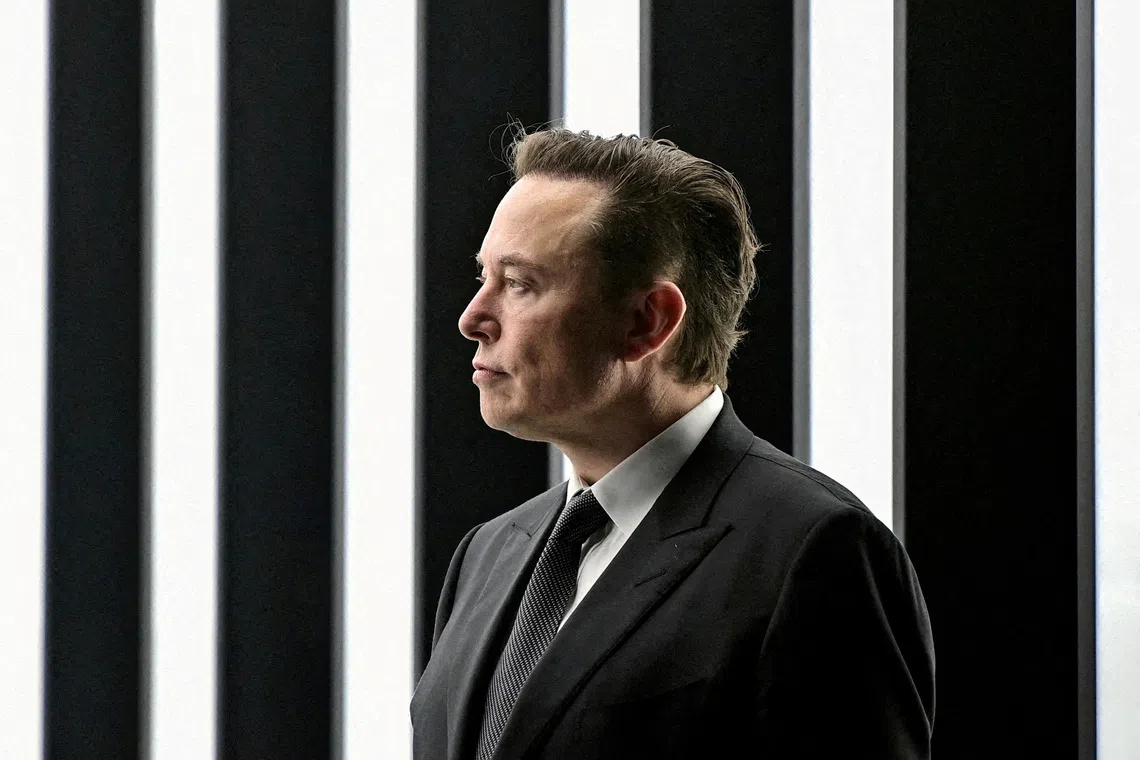Norway’s wealth fund rejects Elon Musk’s $1.3 trillion Tesla pay package
Sign up now: Get ST's newsletters delivered to your inbox

Mr Elon Musk’s pay package is still seen as likely to win, given broad investor support in the past.
PHOTO: REUTERS
Follow topic:
OSLO - Norway’s sovereign wealth fund, Tesla’s sixth-largest outside investor, said on Nov 4 it would vote against ratifying a proposed pay deal for chief executive Elon Musk potentially worth US$1 trillion (S$1.3 trillion).
Mr Musk’s pay package is still seen as likely to win, given broad investor support in the past and the backing Tesla enjoys from its large retail shareholder base.
Laws in Texas, where Tesla moved its headquarters in 2024, also allow the world’s richest man to vote his own large stake, giving him 15.3 per cent of voting power including restricted stock granted in August.
The opposition from stewardship-minded Norges Bank Investment Management (NBIM) was no surprise.
But its direct criticism of the compensation and planned votes against two Tesla board directors add uncertainty to the outcome of a ballot set for Nov 6, corporate governance experts said, and underscore how other European investors may also turn against the electric vehicle maker.
Tesla chair warns Musk could quit
Tesla’s board is pushing for shareholders to approve the plan, with chairwoman Robyn Denholm warning that Mr Musk could leave the US$1.5 trillion market cap firm if the deal is rejected.
“European voters are much more likely to be swayed by where Norges goes, because of the general support of ESG (environmental, social and governance) principles and concerns into their investment philosophy,” said Mr Francis Byrd, a partner at consulting firm Alchemy Strategies Partners.
Mr Byrd and several other consultants said they expect Tesla’s recommendations to prevail at the meeting, since top investors have stuck with him so far.
They also noted how big US investors are under pressure from the Trump administration to apply less public pressure on companies.
That could make it harder to know if there is much opposition until the day of the meeting, said Ms Karla Bos, an independent governance consultant in Arizona.
“Less predictability is the watchword for 2025, and certainly for complicated votes like at Tesla,” Ms Bos said.
Proxy advisers ISS and Glass Lewis have both urged shareholders to reject Mr Musk’s compensation plan, arguing it would be too large, delivering high payouts even if the CEO meets only some goals, and could dilute the holdings of other investors.
Both also opposed a re-ratification vote in 2024 on a 2018 US$56 billion package for Mr Musk.
NBIM said on its website: “While we appreciate the significant value created under Mr Musk’s visionary role, we are concerned about the total size of the award, dilution, and lack of mitigation of key person risk – consistent with our views on executive compensation.”
With a 1.12 per cent stake in Tesla, NBIM is the only one of Tesla’s top 10 outside investors to disclose its voting intentions ahead of the meeting so far.
NBIM also voted “no” on Mr Musk’s previous compensation plan, drawing a sharp response from the CEO, who turned down an invitation to a conference in Oslo.
Tesla’s sales in Norway fell 50 per cent in October, along with declines in some other European markets, amid rising competition and backlash to Mr Musk’s political alliance with US President Donald Trump.
NBIM, which runs US$2.1 trillion, also said it would vote against Tesla’s proposed general stock compensation plan, which is intended for all employees and can also be used by the board to benefit Mr Musk.
Tesla says its CEO would earn “nothing” unless the company’s market value grows substantially and that the maximum award is paid only if the group reaches several milestones, most notably a market value of US$8.5 trillion, a near sixfold increase. REUTERS

